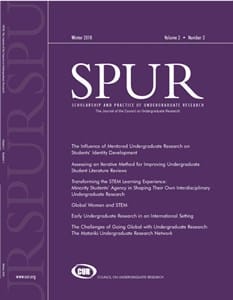SPUR (2018) 2 (2): https://doi.org/10.18833/spur/2/2/8
To determine the logistics, benefits, and challenges of developing and implementing an international undergraduate research network, the authors analyzed the Matariki Undergraduate Research Network (MURN). MURN attempted to connect undergraduate students from four countries across two years, with 21 and 23 students respectively. Using mixed methods, the authors explored faculty and student experiences of MURN. Although MURN worked well at the local level, it had limited success at a global level. Teaching across time zones and academic-year differences posed the biggest challenges. Students and faculty reported a range of benefits typical of engagement with undergraduate research but noted weak international connections. A credit-bearing program with partners in similar time zones and academic-year systems, as well as a requirement for collaborative projects across institutions, are recommended.
More Articles in this Issue
No posts found


